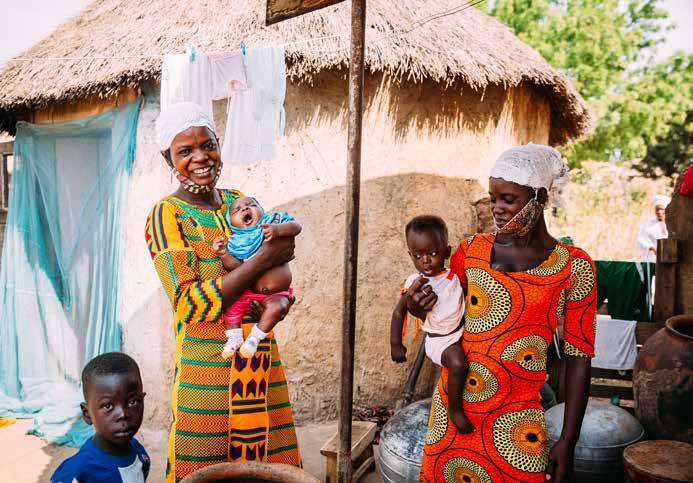
4 minute read
5.3.2 Integrity policy
safeguarding risk management. • The federation published two policy documents in January 2020 to offer youth aid professionals support and guidance: • The SOS Parent User Guide, which sets out the professional requirements for
SOS parents; • The Youth Development User Guide, which provides guidelines related to care for, working with and supporting young people. • Another important element of our efforts to improve has been the Independent Child
Advertisement
Safeguarding Review, a project that started in 2017. We retained the services of the expert international organisation Keeping
Children Safe to conduct the review, which focuses on understanding past cases and the circumstances that contributed to the occurrence of child abuse, with the ultimate goal of helping the organisation to reduce risks in programmes today and in the future. At the time of writing this report, the review has been concluded and presented to the SOS Senate. More on page 63.
Keeping Children Safe Network
SOS Children’s Villages International is a member of the ‘Keeping Children Safe’ (KCS) network; an international child protection organisation that developed the ‘International Child Safeguarding Standards’. In 2017 SOS Children’s Villages was awarded the KCS ‘Level 1’ certification, we are currently in the process of recertification. Our Child Protection Policy is monitored annually using an internal study, based on, for example, the following criteria: the policy in practice, compliance by staff and risk assessment. 5.3.2 INTEGRITY POLICY
International
In all its activities SOS Children’s Villages imposes strict requirements related to openness, transparency and integrity. We adopt the following SOS Children’s Villages International guidelines for integrity: • ‘Good Management and Accountability
Quality Standards’ – the guidelines related to planning, monitoring, reporting and communicating, anti-fraud and corruption and the protection of data and assets. • Anti-fraud and anti-corruption guideline – supplementary guidelines for tackling fraud and corruption. • Child protection policy: Child safety is everybody’s business – the basis of our approach (see page 49 in Chapter 5.3.1
Child safeguarding). • Our Code of Conduct. • Sexual Misconduct Regulations – international policy to prevent and protect against sexual intimidation, aggression, violence, exploitation and abuse, if situations such as these arise within the federation.
Within SOS Children’s Villages International there is an Integrity and compliance network. 1. Local management is responsible for integrity and compliance within the local office concerned. 2. The local integrity and compliance staff member supports employees, local management and the Supervisory Board. 3. The regional integrity and compliance staff member supports the regional office and the local integrity and compliance staff member. 4. The Integrity, Compliance and Legal department at the international office supports the three previous layers and provides everyone with resources and advice. In addition there is an international, online whistleblower channel for reporting possible integrity violations. This is an additional channel, for both internal and external individuals. Our employees can also use it, in addition to submitting an internal report.
In the Annual Corruption Case Report of SOS Children’s Villages International, available at www.sos-childrensvillages.org/ integrity-and-compliance (under: We promise), we provide an insight into the reports submitted and the actions and measures we have taken.
In the Netherlands
In 2020, the following activities were undertaken to further develop the integrity policy and make it part of the HR policy.
• The Integrity Action Plan by the charities sector was used by an external integrity adviser to adapt the HR policy and
Integrity policy. This resulted in an addendum to our Code of Conduct, in which the correct approach to the three areas of integrity violations: Interpersonal violations, Financial violations, Abuse of power, are described in greater detail. • Separate guidelines apply to the Simba
Family Care project, established in a
Simba Family Care Code of Conduct, and a Simba Family Care reporting procedure was set up. • The recruitment and selection policy and reference policy have been fine-tuned. In the job vacancy descriptions we refer to the Child Protection Policy and Code of
Conduct as standard. Everyone: from a potential colleague, consultant and volunteer to a photographer, and people who have to travel to our projects: • Must be able to present a recent
Certificate of Good Conduct (VOG).
The VOG is designed as a resolutive condition; • Signs the Code of Conduct. • The reference policy has been expanded in association with partners in the DRA and the Inter Agency Misconduct Scheme has been implemented. This means that we must request any potential candidate in the Netherlands as well as the countries in which we operate to provide references in a pre-defined manner. Including written confirmation from an integrity coordinator/
HR adviser from a previous job, stating that the person concerned has not been involved in any misconduct. • The Partos Integrity training course is a fixed component of our onboarding process. All new colleagues followed this training course in 2020. • An integrity team was put together at the end of 2020, with several focal persons from the organisation, so the topic is a shared responsibility of the organisation and MT. It meets on a monthly basis and integrity and child safeguarding is placed on the MT agenda once a quarter. • An internal and external confidential counsellor has been appointed. • The external integrity adviser has handed over his role as integrity coordinator to the
HR adviser. • During the year, attention was repeatedly devoted to moral judgement forming and recognising underlying power structures and power balances, including practical discussion sessions. Basic rules on moral judgement forming in MT decisions were subsequently drafted. • Risk analyses were compiled and performed by all teams using the integrity policy and existing procedures. These are safeguarded through monitoring by the integrity team and an inventory is performed every six months. See also
Chapter 5.6 Policy, Finances and Risk
Management, page 52.
In 2020, no internal and/or external reports of integrity violations were received in the Netherlands.










